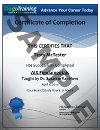Course Description
This Service Design (SD) course provides you with an intense and focused exploration of the new and modified topics in ITIL® 2011. The course is intended for those who work within a Service Design environment and require a deeper understanding of the underlying concepts, processes and activities involved and associated management responsibilities and how they may be used to enhance overall service quality and service provision. The Service Design course focuses on the managerial and control aspects of the operational environment. This course has a number of study units and supporting exercises that reinforce the knowledge gained.
When PeopleCert offered this exam in English, this course received PeopleCert Accredidation. However, PeopleCert no longer offers this exam in English and therefore GogoTraining no longer pays PeopleCert to list this course as an accredited course. If you are looking to understand ITIL V3 Service Design, then this course is a great place to start.
In This Course You Will Learn:
- Discuss the Service Lifecycle and Service Management as a Practice: Understand the Service Lifecycle and the objectives and business value for each phase in the lifecycle; understand and articulate “service” and be able to explain the concept of Service Management as a practice
- Describe basic Service Design Principles: Understand the common principles and guidelines that will influence the performance of SD processes, including service requirements, business requirements and drivers; requirement types and their management techniques; the principles and the five aspects of service design; business service management and service-oriented architectures; service design models
- Review Service Design Processes: Understand the managerial and supervisory aspects of the SD processes. Other areas of discussion include the roles and responsibilities (and their relationship to other Service Management processes, challenges, critical success factors and risks within each of the processes. The processes include:
- Design Coordination
- Service Catalog Management
- Service Level Management
- Availability Management
- Capacity Management
- IT Service Continuity Management
- Information Security Management
- Supplier Management
- Explore Technology and Implementation Considerations: Understand the role of technology to Service Design and explore concepts that have great impact on SD process implementation and service design activities
Prerequisites
ITIL® Foundations training recommended prior to taking the Service Design class. It is also strongly recommended that students read the ITIL Service Lifecycle core publications and, in particular, the ITIL Service Design publications.
Outline
Module 00: Course Introduction
Module 01: Exam Tips
Module 02: Service Management as a Practice Part 1
•Topic One: Components of the Service Lifecycle
•Topic Two: What is a Service?
•Topic Three: What Comprises Value?
•Topic Four: What is Service Management?
•A Process
•A Function
•Generic Roles
Module 03: Service Management as a Practice Part 2
•Purpose and Objectives of Service Design
•Scope of Service Design
•Generic SD Roles
•Service Design – Value to the Business
•SD Inputs and Outputs
•SD Challenges, Critical Success Factors, and Risks
•Key Concepts for Service Design
Module 04: Exercise: ITSM and Failure
Module 05: Service Design Principles Part 1
•Overview
•Balanced Design
•Service & Business Requirements
•Design Activities & Constraints
Module 06: Design Aspects Part 1
•The 5 Aspects of Service Design
•Designing Service Solutions
•Designing the Management Information Systems
•Designing the Technology and Architecture
Module 07: Design Aspects Part 2
•Designing Processes
•RACI Diagram
•Designing Measurement Systems and Metrics
Module 08: Design Aspects Part 3
•Service Oriented Architecture (SOA)
•Service Design Models
•Exercise: Designing Service Acceptance Criteria
Module 09: Design Coordination (DC)
•Purpose & Objectives
•Value to the Business
•Policies/Principles/Basic Concepts
•Process Overview
•Roles
•Triggers, Inputs/Outputs, Interfaces
•Metrics
Module 10: Service Catalog Management (SCatM) Part 1
•Purpose & Objectives
•Value to the Business
•Policies/Principles/Basic Concepts
Module 11: Service Catalog Management (SCatM) Part 2
•Process Overview
•Roles
•Triggers, Inputs/Outputs & Interfaces
•Metrics
Module 12: Service Level Management (SLM) Part 1
•Purpose & Objectives
•Value to the Business
•Policies/Principles/Basic Concepts
Module 13: Service Level Management (SLM) Part 2
•Process Overview
•Roles
•Triggers, Inputs/Outputs & Interfaces
•Metrics
•Sample Service Catalog Entry
•Sample SLA
•Sample OLA
Module 14: Availability Management (AM) Part 1
•Purpose & Objectives
•Value to the Business
•Policies/Principles/Basic Concepts
•Process Overview
Module 15: Availability Management (AM) Part 2
•Process Activities
•Roles
•Triggers, Inputs/Outputs & Interfaces
•Metrics
Module 16: Capacity Management (CapM) Part 1
•Purpose & Objectives
•Value to the Business
•Policies/Principles/Basic Concepts
Module 17: Capacity Management (CapM) Part 2
•Process Overview
•Roles
•Triggers, Inputs/Outputs & Interfaces
•Metrics
Module 18: IT Service Continuity Management (ITSCM) Part 1
•Purpose & Objectives
•Value to the Business
•Policies/Principles/Basic Concepts
Module 19: IT Service Continuity Management (ITSCM) Part 2
•Process Overview
•Roles
•Triggers, Inputs/Outputs & Interfaces
•Metrics
Module 20: Information Security Management (ISM) Part 1
•Purpose & Objectives
•Value to the Business
•Policies/Principles/Basic Concepts
Module 21: Information Security Management (ISM) Part 2
•Process Overview
•Roles
•Triggers, Inputs/Outputs & Interfaces
•Metrics
Module 22: Supplier Management (SuppM)
•Purpose & Objectives
•Value to the Business
•Policies/Principles/Basic Concepts
•Process Overview
•Roles
•Triggers, Inputs/Outputs & Interfaces
•Metrics
•Exercise: Supplier Management Process Flow
Module 23: Implementing Service Design
•General Implementation Considerations
•Implementation Framework
•Measurement of Service Design
•Prerequisites for Success (PFS)
Module 24: Requirements Engineering
•Requirement Types
•Requirement Investigation
•Documenting Requirements
•Requirements Catalogue
Module 25: Data, Information & Application Management
•Managing Data and Information
•Application Management
•Application Portfolio
•Application Design
Module 26: Service Management Technology
•Tools for Service Design
•Service Management Technology
•Tool Selection Process
How can we help? Customer Service is standing by to answer your questions.


